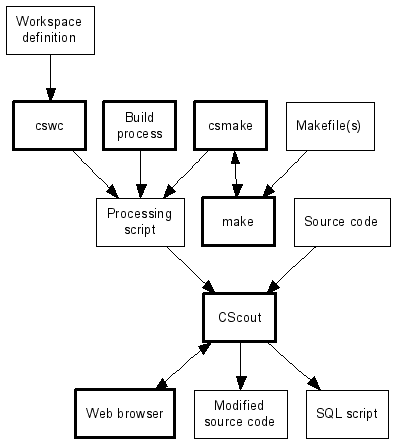Workflow
The following diagram illustrates the data flow when working with
CScout.

The thick-lined objects depict active processes;
the thin-lined objects depict data.
CScout will analyze and process C source code under the directions
of a processing script.
After some user interactions through a web browser CScout can
write out the modified source code.
CScout can also convert the C source code
into an SQL script that can be further analyzed and processesed through
an RDBMS.
There are three ways to generate the processing script:
- Through a workspace definition file, processed by the workspace compiler cswc.
- By having the csmake command monitor the build process.
- By tailoring a project's build process to generate a processing script.
Workspace definition files offer by far the most readable and transparent way to setup a CScout workspace. They are declarative and express exactly the operations that CScout will perform. On the other hand, they can be difficult to specify for an existing large project and they must be kept in sync with the project's build process.
Running your make process under the csmake command is a
very easy way to generate a CScout processing script.
This method however only works if the essentials of your make process
aren't too contrived.
csmake can handle builds implemented through the Unix-related
make,
gcc, ld, ar, and mv commands.
It has been successfuly tested on the Linux and FreeBSD kernels and the Apache
web server.
If csmake can deal with your project, you will be up and running
in minutes; if not, you will only have lost those few minutes.
Another advantage of the csmake method
is that csmake will obtain from
the compiler the predefined macros and the include file path.
As a result you often don't have to tailor the files
host-incs.h and host-defs.h
to match you environment;
you can directly use the supplied file gcc-defs.h,
which provides workarounds for GCC extensions.
Tailoring your project's build process to generate a CScout processing script is a final possibility. Here you gain maximum flexibility and integration with the project build system at the expense of having to modify the project's build procedure. If the project is relatively large and the build procedure is under your control, this may be an option worth investigating.